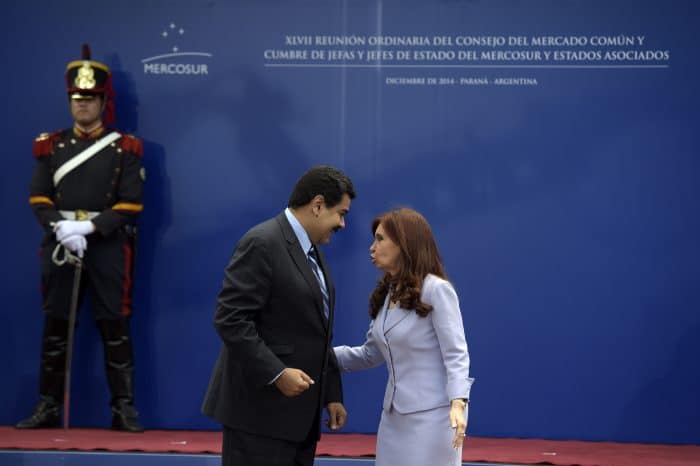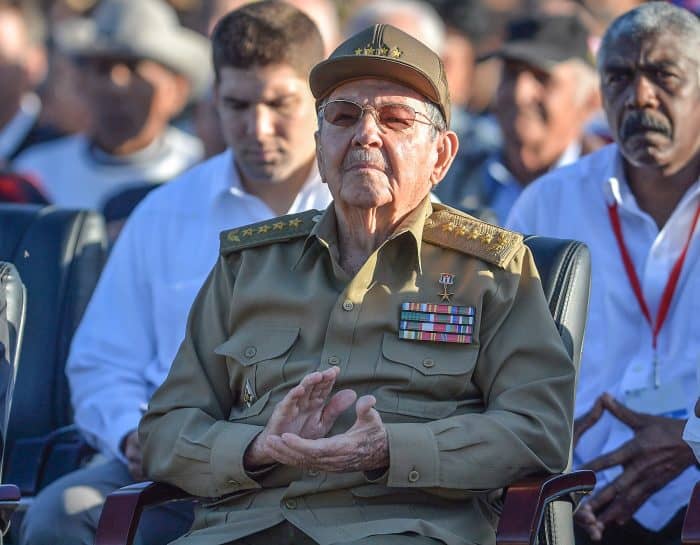https://twitter.com/durancandanga/status/545777051236851713
In a terse statement from Havana this week, Cuban President Raúl Castro announced the start of a new era of cautious rapprochement with the United States. Castro’s speech was notably lacking in the usual fiery tirades against imperialism: he graciously thanked President Barack Obama, the Vatican, and the government of Canada (the U.S.’ frequent go-between when dealing with unfriendly states) for making the breakthrough possible. Raúl took the occasion to claim that his brother Fidel has often expressed, both publicly and privately, his desire for closer ties with the U.S.
Many Cubans were thrilled by the news. But the announcement was a cold shower for Venezuelan President Nicolás Maduro, the Cuban government’s longtime financial benefactor and a staunch “anti-imperialist” in his own right. Despite the unusually close diplomatic ties between Caracas and Havana (even their intelligence services are interlinked), Maduro appears to have been caught completely off guard. Although the news of the Castros’ deal with Obama had already spread around the world by Wednesday morning, the Venezuelan regime’s tightly controlled state media apparatus neglected to mention it until many hours later, patiently awaiting a cue from Maduro rather than risk reporting the story without a pre-approved editorial line.
When the Venezuelan president eventually did issue a statement, speaking from a regional summit in Argentina, he focused entirely on the freeing of the Cuban prisoners, calling it “the most important ‘gesture’ of Obama’s presidency.” The restoration of diplomatic ties and the possible easing of the 64-year-old embargo were passed over with nary a word. After briefly complimenting the Cuban people on their deeply principled and independent spirit, he began to banter with Argentine president Cristina Kirchner about it being the birthday of Pope Francis. Soon after that, as if on cue, reports about the shift in U.S.-Cuba relations began cropping up on Venezuelan state media – but only about the prisoner exchange. It wasn’t until evening that the broader diplomatic aspects of the deal were touched upon, gingerly.
For Maduro, this is a particularly awkward moment for his country’s closest regional ally to be making nice with his country’s greatest foe, the much-maligned “Northern Empire.” The United States serves as his perennial bogeyman, blamed for everything from Venezuela’s poor credit rating and the collapsing price of international crude to his own recent cold and the death of his hallowed predecessor Hugo Chávez from cancer last year. Maduro’s own relations with Washington recently reached a low point, exemplified by last week’s decision by the U.S. Congress to pass sanctions targeting Venezuelan officials implicated in “significant acts of violence or serious human rights abuses” during a rash of country-wide protests and barricades that paralyzed much of the country earlier this year.

Maduro, with typical bombast, has told the U.S. State Department, quite literally, where they could stick their visas. (The irony that Cuban officials will likely soon be eligible for U.S. visas has certainly not been lost on many Venezuelans.) Maduro’s many numerous passionate diatribes against “Yankee insolence” during this last week, which included appeals to Venezuelans to burn their own U.S. visas in solidarity as well as a lavish state-sponsored “march against imperialism” staged in Caracas, now stand in stark contrast to Cuba’s own willingness to consider diplomatic ties with Washington.
Despite years of grandiose socialist rhetoric, mutual promises, and more than a decade of close personal friendship between Chávez and Fidel, the regime in Havana has clearly figured out that it’s time to adapt to a changed world. Having remained dependent economically on the generosity of ideological allies for decades, Cuba was caught off guard by the sudden collapse of its long-time benefactor, the Soviet Union. That mistake led to a multiyear period of harrowing shortages and widespread poverty, punctuated by acute periods of outright famine, until Chávez stepped in as new benefactor during the early 2000s. Since that time, Cuba has received substantial financial largesse, estimated at around $5 billion dollars annually. In recent years, Havana’s resale of excess oil received from Venezuela has become a crucial source of foreign currency. In exchange, Cuba provides revolutionary credibility, national camaraderie, doctors to replace Venezuela’s fleeing professional class, and the services of “advisors” to train military intelligence and security forces.
This was an excellent deal for the Cuban regime while it lasted, but the timing of the Castros’ new arrangement with the U.S. coincides with a perception that their client relationship with Venezuela has entered a period of diminishing returns. Caracas has already slashed funding for Petrocaribe, the program through which Venezuela gives subsidized oil to its other friends in the region, and the liquidity-strapped regime has even gone so far as to sell off the outstanding debts from program recipients to U.S. investment banks, who are likely to be far less forgiving in pursuing repayment. Though Cuba’s own (much larger) aid package from the Venezuelans remains opaque, one regime insider recently told me that it, too, has been hard hit, cut by around 20 percent over the last few months. Despite Maduro’s self-serving rhetoric, future U.S. tourism dollars, increased remittances, and access to foreign markets could easily replace the resale value of Venezuelan oil. Cuba’s wily leaders have made it clear that they’re more willing to offend Maduro than to risk being left standing when the salsa stops.

This week several prominent figures from within the pro-Chávez movement have taken to social media in an effort to spin Havana’s shift as anything but a sign of lost confidence in Venezuela. These commentators try to argue that the U.S. has finally been brought to heel, and that the wisdom of Hugo Chávez is almost certainly responsible for the triumph. While the role of Hugo Chávez’s wisdom may be debatable, his death was clearly a factor. The U.S. and Cuba apparently began their secret talks in June 2013, mere weeks after Chávez’s death and the inauguration of Maduro as president.
That the Cubans aimed to hedge their bets so early in his administration hardly comes across as a vote of confidence in Maduro. The Castros may have been slightly ahead of the curve in this respect, but Chávez’s handpicked heir now faces a clear crisis of confidence across the board. His approval rating is languishing in the mid 20s, other party leaders are showing increased assertiveness and visibility, and international markets see imminent risk of a sovereign default. It is clear that few observers believe Maduro to be the man to adapt Venezuela’s collapsing economy to this strange new world of sub-$60 oil – one in which Havana may soon have its own ambassador in Washington, while Caracas does not.
Lansberg-Rodríguez teaches on Latin America at Northwestern’s Kellogg School of Management and is a weekly columnist for the Venezuelan daily newspaper El Nacional. His Twitter handle is @Dlansberg.
Read more of our Cuba coverage here
Read more of our Venezuela coverage here
© 2014, Foreign Policy
